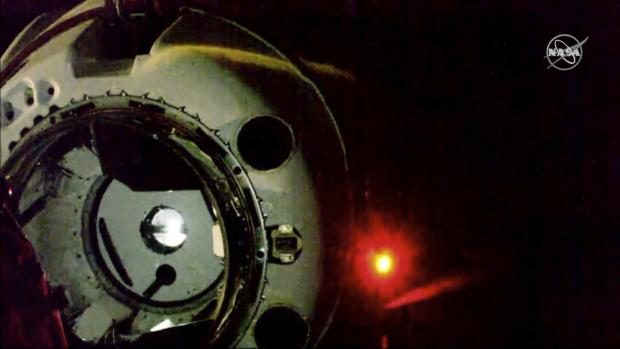SpaceX postpones first commercial launch due to strong wind

In this image taken from NASA Television, Sunday, March 3, 2019. SpaceX’s new crew capsule approaches just before docking at the International Space Station Sunday, March 3, 2019. SpaceX’s new crew capsule arrived at the International Space Station, acing its second milestone in just over a day. No one was aboard the Dragon capsule launched Saturday on its first test flight, only an instrumented dummy. (Photo from NASA TV via AP)
COLORADO SPRINGS — SpaceX postponed Wednesday what would have been its first commercial launch with the Falcon Heavy rocket, citing strong wind in the upper atmosphere.
The next window for the mission is Thursday, the company said.
Standing down from today’s Falcon Heavy launch attempt; next opportunity is tomorrow, April 11.
— SpaceX (@SpaceX) April 10, 2019
The rocket is to carry a Saudi satellite operated by Arabsat, a year after sending founder Elon Musk’s red Tesla roadster into orbit as a test.
The Falcon Heavy had been scheduled to lift off from the Kennedy Space center in Florida at 6:36 pm (2236 GMT) and place the six-ton Arabsat-6A satellite into geostationary orbit about 22,500 miles (36,000 kilometers) above the Earth.
#Arabsat team at the facility to witness the launch of #Arabsat6A @SpaceX #Falconheavy pic.twitter.com/8zQSz7OPqc
— Arabsat – عرب سات (@Arabsat) April 10, 2019
Because of the winds, this was later pushed back by about two hours, to the very end of the launch window.
Now it has been scrapped until Thursday.
SpaceX has two operational rockets: the Falcon 9, which with 21 launches in 2018 dominates the US market, and the Falcon Heavy, which as its name suggests is designed to lift much heavier payloads into more distant orbits.
It consists of the equivalent of three Falcon 9 rockets combined, tripling its thrust. SpaceX will attempt to re-land the rocket’s three boosters.
Falcon Heavy and Arabsat-6A are vertical on Launch Complex 39A. Currently targeting liftoff at 8:00 p.m. EDT; monitoring upper-level winds that could push us to the end of the window (8:32 p.m. EDT) → https://t.co/gtC39uBC7z pic.twitter.com/Vbzbhy6PLz
— SpaceX (@SpaceX) April 10, 2019
In its first launch, in February 2018, a dummy dubbed Starman was placed behind the wheel of Musk’s roadster, which is currently orbiting the Sun somewhere between Earth and Mars.
Since then, the US military and private clients have signed contracts for Falcon Heavy launches, and NASA has raised the possibility it may use the rocket for its planned missions to the Moon.